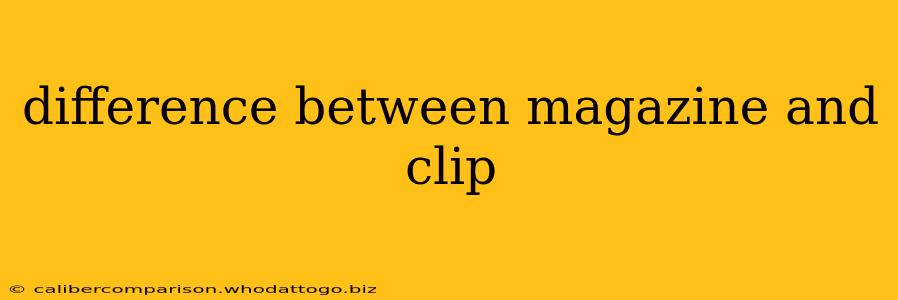Magazine vs. Clip: Understanding the Key Differences
The terms "magazine" and "clip" are often used interchangeably, especially in casual conversation, but they represent distinct components in firearms and other mechanisms. Understanding their differences is crucial for safety, proper operation, and effective communication among enthusiasts and professionals. This article will delve into the key distinctions between magazines and clips, exploring their functionalities, designs, and applications.
Defining "Magazine"
A magazine is a detachable or integral storage and feeding device for ammunition. It holds cartridges and feeds them one at a time into the firearm's chamber for firing. Magazines are typically box-shaped or drum-shaped and are designed to be easily removed and replaced. Key characteristics include:
- Self-feeding: Magazines utilize a spring and follower system to push cartridges upward, ready for chambering. The firearm's mechanism then strips the cartridge from the magazine.
- Detachability: While some firearms have integrated magazines (fixed magazines), most modern designs utilize detachable magazines for quick reloading and ammunition versatility.
- Capacity: Magazines vary greatly in capacity, from single-shot to high-capacity designs, depending on the firearm and its intended use.
- Type: There are various types of magazines, such as box magazines, rotary magazines, drum magazines, and helical magazines, each with unique features and advantages.
Defining "Clip"
A clip, on the other hand, is a temporary device used primarily for loading cartridges into the firearm's internal mechanism, often a magazine or directly into the firearm's chamber. Unlike magazines, clips don't typically feed ammunition. Their key features include:
- Non-feeding: Clips simply hold cartridges together for quick insertion. The firearm's operation relies on a different mechanism to chamber and fire the rounds.
- Temporary Use: Clips are usually discarded after loading.
- Limited Functionality: Clips are far less versatile than magazines. They lack the spring-loaded feed system found in magazines.
- Examples: The classic "stripper clip" used in bolt-action rifles like the Mauser 98k is a prime example. This type of clip is designed to hold a stack of cartridges which are then pushed into the magazine or internal mechanism.
Key Differences Summarized
| Feature | Magazine | Clip |
|---|---|---|
| Function | Stores and feeds ammunition | Holds cartridges for loading |
| Feeding | Self-feeding (spring-loaded) | Non-feeding |
| Detachable | Usually detachable; some exceptions exist | Usually not detachable, temporary use |
| Capacity | Varies greatly | Typically holds a limited number of rounds |
| Use | Primary ammunition storage and feeding | Aid in loading ammunition |
Understanding the Nuances
While the distinction seems clear-cut, some firearms may blur the lines. For example, some older designs might use a fixed internal magazine that could be considered a type of clip, depending on its specific mechanism. However, the fundamental difference remains: magazines actively feed ammunition, while clips merely facilitate loading.
Understanding the difference between magazines and clips is crucial for safe and efficient handling of firearms. Knowing the specific terminology helps in communication and avoids confusion, especially when discussing firearm operation and maintenance.

